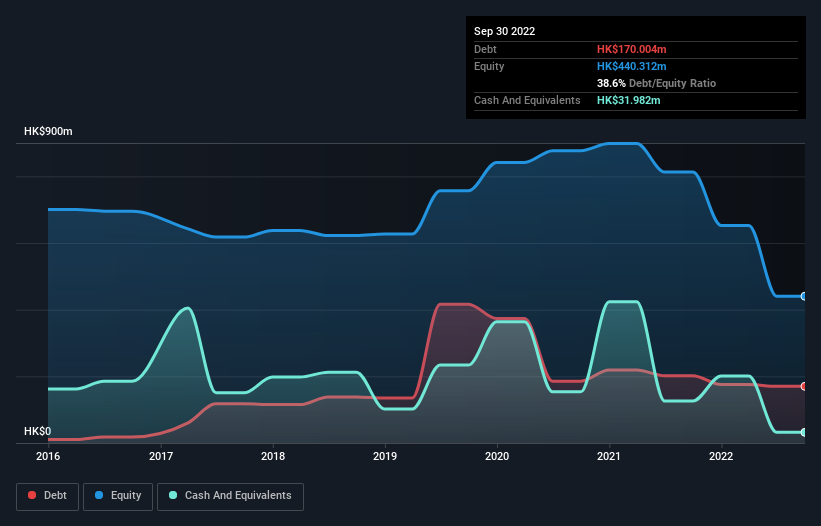
The external fund manager backed by Berkshire Hathaway's Charlie Munger, Li Lu, makes no bones about it when he says 'The biggest investment risk is not the volatility of prices, but whether you will suffer a permanent loss of capital.' So it might be obvious that you need to consider debt, when you think about how risky any given stock is, because too much debt can sink a company. We can see that Magnus Concordia Group Limited (HKG:1172) does use debt in its business. But the more important question is: how much risk is that debt creating?
Why Does Debt Bring Risk?
Debt is a tool to help businesses grow, but if a business is incapable of paying off its lenders, then it exists at their mercy. Ultimately, if the company can't fulfill its legal obligations to repay debt, shareholders could walk away with nothing. However, a more usual (but still expensive) situation is where a company must dilute shareholders at a cheap share price simply to get debt under control. Of course, debt can be an important tool in businesses, particularly capital heavy businesses. When we think about a company's use of debt, we first look at cash and debt together.
Check out the opportunities and risks within the HK Commercial Services industry.
What Is Magnus Concordia Group's Net Debt?
The image below, which you can click on for greater detail, shows that Magnus Concordia Group had debt of HK$170.0m at the end of September 2022, a reduction from HK$201.7m over a year. However, it also had HK$32.0m in cash, and so its net debt is HK$138.0m.

How Strong Is Magnus Concordia Group's Balance Sheet?
According to the last reported balance sheet, Magnus Concordia Group had liabilities of HK$815.1m due within 12 months, and liabilities of HK$43.8m due beyond 12 months. Offsetting this, it had HK$32.0m in cash and HK$71.7m in receivables that were due within 12 months. So its liabilities outweigh the sum of its cash and (near-term) receivables by HK$755.3m.
This deficit casts a shadow over the HK$283.2m company, like a colossus towering over mere mortals. So we'd watch its balance sheet closely, without a doubt. After all, Magnus Concordia Group would likely require a major re-capitalisation if it had to pay its creditors today. The balance sheet is clearly the area to focus on when you are analysing debt. But you can't view debt in total isolation; since Magnus Concordia Group will need earnings to service that debt. So when considering debt, it's definitely worth looking at the earnings trend. Click here for an interactive snapshot.
Over 12 months, Magnus Concordia Group reported revenue of HK$1.5b, which is a gain of 7.2%, although it did not report any earnings before interest and tax. We usually like to see faster growth from unprofitable companies, but each to their own.
Caveat Emptor
Importantly, Magnus Concordia Group had an earnings before interest and tax (EBIT) loss over the last year. Its EBIT loss was a whopping HK$419m. If you consider the significant liabilities mentioned above, we are extremely wary of this investment. That said, it is possible that the company will turn its fortunes around. Nevertheless, we would not bet on it given that it vaporized HK$17m in cash over the last twelve months, and it doesn't have much by way of liquid assets. So we consider this a high risk stock and we wouldn't be at all surprised if the company asks shareholders for money before long. When analysing debt levels, the balance sheet is the obvious place to start. But ultimately, every company can contain risks that exist outside of the balance sheet. For instance, we've identified 3 warning signs for Magnus Concordia Group (2 are a bit concerning) you should be aware of.
At the end of the day, it's often better to focus on companies that are free from net debt. You can access our special list of such companies (all with a track record of profit growth). It's free.
New: Manage All Your Stock Portfolios in One Place
We've created the ultimate portfolio companion for stock investors, and it's free.
• Connect an unlimited number of Portfolios and see your total in one currency
• Be alerted to new Warning Signs or Risks via email or mobile
• Track the Fair Value of your stocks
Have feedback on this article? Concerned about the content? Get in touch with us directly. Alternatively, email editorial-team (at) simplywallst.com.
This article by Simply Wall St is general in nature. We provide commentary based on historical data and analyst forecasts only using an unbiased methodology and our articles are not intended to be financial advice. It does not constitute a recommendation to buy or sell any stock, and does not take account of your objectives, or your financial situation. We aim to bring you long-term focused analysis driven by fundamental data. Note that our analysis may not factor in the latest price-sensitive company announcements or qualitative material. Simply Wall St has no position in any stocks mentioned.
About SEHK:1172
Magnus Concordia Group
An investment holding company, engages in the property, printing, and treasury businesses in Hong Kong, Mainland China, the United States, the United Kingdom, France, and internationally.
Low and slightly overvalued.
Similar Companies
Market Insights
Community Narratives




